
"An American Trilogy" is a 1972 song medley arranged by country composer Mickey Newbury and popularized by Elvis Presley, who included it as a showstopper in his concert routines. The medley uses three 19th-century songs:
Milton Sims "Mickey" Newbury Jr. was an American singer-songwriter and a member of the Nashville Songwriters Hall of Fame.
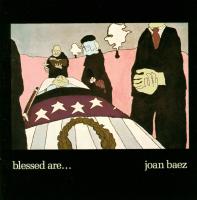
Blessed Are... is the twelfth studio album by Joan Baez and her last with Vanguard Records, released in July 1971. It included her hit cover of The Band's "The Night They Drove Old Dixie Down" and songs by Kris Kristofferson, the Beatles, Jesse Winchester, and The Rolling Stones as well as a significant number of Baez' own compositions. Like its immediate predecessors, the album was recorded in Nashville and had a decidedly country feel.

Marvin Gaye Recorded Live on Stage is the first live album released by singer Marvin Gaye on the Tamla label. Recorded during a Motortown Revue show at Chicago's Regal Theater, the album showcased the musician performing early hits such as "Stubborn Kind of Fellow", "Pride and Joy" and "Hitch Hike" while also adding in unreleased songs including "One of These Days", "Mo Jo Hanna" and That Stubborn Kinda Fellow album track, "Get My Hands on Some Lovin'" while also singing three covers - the jazz standard, "Days of Wine and Roses", blues song "Mo Jo Hanna" and his cover of Ray Charles' R&B version of "You Are My Sunshine".
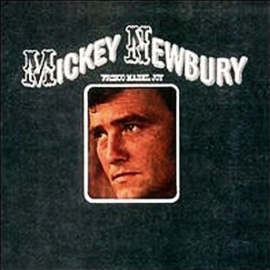
'Frisco Mabel Joy is a 1971 studio album by singer-songwriter Mickey Newbury. This was the second of three albums Newbury recorded at Cinderella Sound. The album includes the original version of "An American Trilogy", which Elvis Presley later performed in his Las Vegas shows with much success. "How Many Times " is a dramatically re-imagined version of a song first released on Harlequin Melodies, Newbury's RCA debut. Other standout tracks include "The Future's Not What It Used to Be", "Remember the Good", "Frisco Depot", and "How I Love Them Old Songs". The track "San Francisco Mabel Joy" was not initially part of the album, though it is included on some versions. ’Frisco Mabel Joy was collected for CD issue on the eight-disc Mickey Newbury Collection from Mountain Retreat, Newbury's own label in the mid-1990s, along with nine other Newbury albums from 1969 to 1981. In 2011, it was reissued again, both separately and as part of the four-disc Mickey Newbury box set An American Trilogy, alongside two other albums recorded at Cinderella Sound, Looks Like Rain and Heaven Help the Child. This release marks the first time that 'Frisco Mabel Joy has been released on CD in remastered form, after the original master tapes were rediscovered in 2010.

Tattoo is an album by country musician David Allan Coe, released in 1977 on Columbia Records.

Texas Moon is an album recorded by country musician David Allan Coe in 1973, but not released until 1977 on Plantation Records.
Cortelia Clark was an American blues singer and guitarist, known for his performances on the streets of Nashville. He won a Grammy Award for Best Folk Recording in 1967, for the album Blues in the Street, his only recording.

Looking for the Sunshine is an album by the American folk music group the Kingston Trio, released in 1983. It was the first release comprising mostly new material since Children of the Morning in 1966. The album had little distribution, failed to chart and the two singles released from it were used for promotional purposes only. It is out of print.

Looks Like Rain is a 1969 concept album by singer-songwriter Mickey Newbury. After recording his debut album with RCA, Newbury was dissatisfied with the resulting album and left RCA to pursue a style closer to his tastes. Recorded at Cinderella Sound, as his next two albums would be, the result is widely considered his first real recording and represents a peak in the singer songwriter movement, especially for Nashville. The sound and style of the record would be highly influential during the Outlaw Movement during country music in the 1970s especially on albums by David Allan Coe and Waylon Jennings. Linking the tracks with delicate arrangements and liberal amount of atmosphere, the record contains some of Newbury's most celebrated compositions including "She Even Woke Me Up to Say Goodbye", "33rd of August", "I Don't Think Much About Her No More", and "San Francisco Mabel Joy". AllMusic's review of the album concludes, "Looks Like Rain is so fine, so mysterious in its pace, dimension, quark strangeness and charm, it defies any attempt at strict categorization or criticism; a rare work of genius."
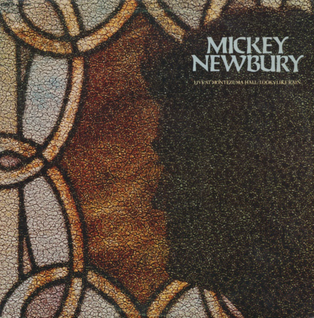
Live at Montezuma Hall is the first live album from singer-songwriter Mickey Newbury, recorded at Montezuma Hall at San Diego State University in 1973. Featuring Newbury performing solo with an acoustic guitar, the album is notable for touching renditions of many of Newbury's excellent songs and for his personable and humored performance. The set was not edited for the album.

The Mickey Newbury Collection collects the ten albums Mickey Newbury released on three labels between 1969 and 1981 on an eight disc set. The set was released and is available through Mountain Retreat, a label run by Newbury and later Newbury's family. While Newbury had an impressive reputation as an artist and songwriter, at the time of the set's release in 1998, these recordings had been out of print for years. The original master tapes were lost by the labels, and so the recordings on the collection are digital transfers from virgin vinyl copies. The packaging replicates the original album art.
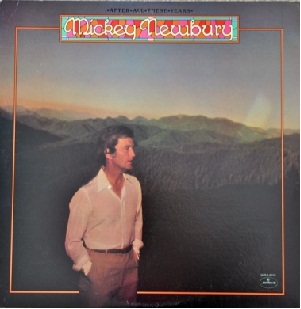
After All These Years is the 1981 album by singer-songwriter Mickey Newbury. Considered the concluding album of his remarkable 1970s run, it was the last album he would record for seven years. The album is very different in tone from its predecessor and revives Newbury's talent for song suites with "The Sailor/Song of Sorrow/Let's Say Goodbye One More Time". Other highlights on the album include "That Was The Way It Was Then" and "Over the Mountain".
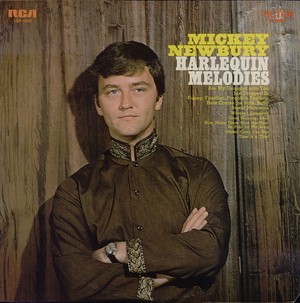
Harlequin Melodies is the 1968 debut album by singer-songwriter Mickey Newbury. Newbury was already a successful songwriter in Nashville, signed by Acuff-Rose Publishing. At one point he had four #1 hits on different charts for Eddy Arnold, Solomon Burke, The First Edition, and Andy Williams, and he had written hits for several others. Produced by Elvis Presley producer Felton Jarvis, Harlequin Melodies concentrates on Newbury's versions of his hit songs; nearly every song on the album has been covered by other artists.
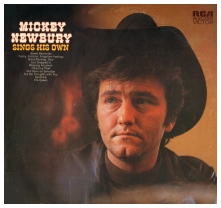
Sings His Own is the 1972 compilation album by singer-songwriter Mickey Newbury, a revised edition of his debut Harlequin Melodies, released by RCA Records in 1972, after the critical notice of Newbury's highly acclaimed Looks Like Rain and Frisco Mabel Joy. Newbury's RCA debut heavily featured songs that had been made into hits by other artists, and there is not much difference between that set and this one. Newbury largely disowned his RCA recordings, considering 1969's Looks Like Rain his true debut, and this album bears little stylistic similarity to anything else in his catalog.
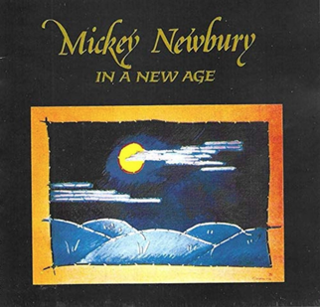
In a New Age is a 1988 album by the singer-songwriter Mickey Newbury. It contains new versions of eight classic Newbury songs, with a full version of "All My Trials" which is part of Newbury's "An American Trilogy"

An American Trilogy is a box set of three remastered albums by Mickey Newbury recorded between 1969 and 1973 at Cinderella Sound, in Madison, Tennessee, alongside an additional album of rare and unreleased recordings, entitled Better Days. It was released in 2011 on Saint Cecilia Knows, in association with the Newbury family and their label Mountain Retreat. The box includes the albums Looks Like Rain, Frisco Mabel Joy and Heaven Help The Child. All three albums have been remastered for the first time on CD from the original master tapes, long thought to have been destroyed in a fire.

Love Country Style is a studio album by Ray Charles, released in June 1970 on Charles' Tangerine Records label.
Bobby Thompson was an American banjoist and guitarist. He worked as a session musician from the 1960s through 1980s. He recorded with Johnny Cash, Loretta Lynn, Neil Young, Perry Como, among others.
Chris Campion is a British author, journalist, ghostwriter, editor, producer, and filmmaker. His work has been published in The Guardian, Telegraph, Los Angeles Times, Rolling Stone, Vice, and Dazed & Confused. He is the founder of reissue label Saint Cecilia Knows.
















